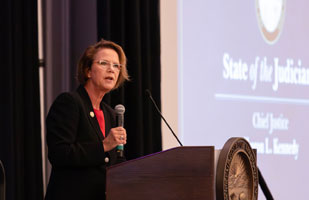Chief Justice Speaks to Ohio Judiciary in Changing Times

Chief Justice Sharon L. Kennedy spoke to more than 400 judges during the State of the Judiciary.

Chief Justice Sharon L. Kennedy spoke to more than 400 judges during the State of the Judiciary.
Chief Justice Sharon L. Kennedy delivered the annual State of the Judiciary address to the Ohio Judicial Conference. She spoke to over 400 judges and court leaders about the changes facing the judiciary and how they can work together to impact their communities.
“Judges across the state are embracing opportunities to change lives, to pivot and change with changing times, to adapt to changes that they see on the horizon, while remaining committed to the Rule of Law,” she said.
Restoring Lives
Currently, there are 214 Ohio judges running a certified specialized docket. The chief justice looked to courts in Franklin, Summit, and Cuyahoga counties that are serving victims of human trafficking through their specialized programs. She hopes that more judges will be inspired by their life-changing work and aims to certify more dockets in the future.
Similarly, Chief Justice Kennedy prioritizes successful reentry for those involved in the justice system. She announced that the Reentry Task Force has formed two subcommittees, focused on prison reentry and jail release. The task force will continue studying best practices and will report their findings in June 2024.
Timely Administration of Justice
Chief Justice Kennedy has heard from judges who are challenged by overaged cases and case backlogs. The Supreme Court of Ohio has helped local courts modernize their case management systems and other technology with $3 million in grants this year. Opportunities like Settlement Week are available to courts seeking to improve their case management.
“It offers a court managed mediation program for pending civil or domestic relations cases. You designate a week or even just a few days,” the chief justice explained. “Then, select the cases based on recommendations from judges, attorneys, or the parties. And assign a trained mediator.”
Chief Justice Kennedy spoke about the judicial assignment program and the need for more judges to take cases. Judges in neighboring counties have been working together to help one another out in the event of a personal illness or family emergency through reciprocal assignments. She encouraged them to consider bringing this program to their courts.
Serving Every Ohioan
As Ohio’s largest cities continue to attract more people, Chief Justice Kennedy is focused on representation in rural, underserved counties.
“Three quarters of Ohio's attorneys are in the state's seven largest counties. That leaves only 25% of attorneys to represent the legal needs of people in the other 81 counties. Approximately 6.5 million people live in those under-represented counties,” Chief Justice Kennedy said.
Chief Justice Kennedy is partnering with the Ohio State Bar Association, the Ohio Judicial Conference, host of the State of the Judiciary, and the Access to Justice Foundation to develop and encourage young leaders to practice law in those communities.
She also discussed Supreme Court materials that give courts guidance on emerging topics. The most recent toolkits and resources cover information on victim’s rights, improved school attendance, and child welfare representation.
As judges continue to adapt to changing times, Chief Justice Kennedy left them with a word of encouragement.
“Ohio judges are strong, steady, reasoned, and I am grateful to be one of you. And so, I am pleased to report to all of you today, the state of the judiciary in Ohio is strong,” she said.


